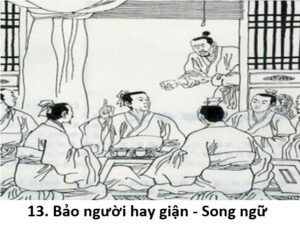Bảo người hay giận – Commenting On Someone’s Quick Temper – Song ngữ
English: Tetcheng Liao.
Việt ngữ: Hòa Thượng Thích Tâm Châu.
Compile: Middle Way Group.

Commenting On Someone’s Quick Temper – BẢO NGƯỜI HAY GIẬN
Once a group of people sat in a house commenting on someone as being of good virtue except for two faults: First, he was quick- tempered. Second, he was impulsive.
Xưa có người cùng ngồi với nhiều người trong một nhà, khen một người ngoại-đạo có đức-hạnh tốt nhưng, còn bị hai lỗi: một là hay giận, hai là làm việc hấp-tấp.
At the time, this man happened to pass by the door and heard the comment. He entered the house, grabbed the man who had criticized him, and started to beat him. Thereupon one bystander asked why he beat the man. He replied, “When did I ever lose my temper or act impulsively? This man said: I often did so. That’s why I have beaten him.”- The bystander pointed out, “Your action at once demonstrates that you have often lost your temper and acted impulsively. Why do you still want to conceal your character from others?” – This man who resents to having his faults exposed, often leads people to lay all the blame for the stupidity and foolishness on him.
Trong khi ấy người kia đi qua ngoài cửa nghe thấy tức-giận vào ngay trong nhà, núm lấy người kia, đánh một thôi. Những người đứng bên hỏi: “Cớ sao ông lại đánh người ta?” Người ấy đáp: “Tôi có khi nào hay giận và làm việc hấp-tấp đâu, thế mà ông này dám bảo tôi là hay giận và làm việc hấp-tấp!” Những người đứng bên bảo: “Chà, cái dáng hay giận và hấp-tấp của ông hiện rõ-ràng như thế mà ông còn kiêng-kỵ! Người nói lỗi ác cho, lại sinh ra oán-trách như thế, quyết bị mọi người chê là ngu-hoặc!”
People, who are addicted to drinking and other debaucheries, when scolded by others, strongly hate their critics in turn. Moreover, they try desperately to justify themselves by bringing forward all sorts of excuses. Those men are just like that stupid man who disliked hearing about his faults discussed.
Bọn uống rượu say-sưa làm nhiều sự càn-rỡ, thấy người chê-trách sinh tâm oán-ghét, dẫn chứng sự mê-khổ, tự làm rõ-ràng thêm. Như người ngu kiêng nghe lỗi mình, thấy người nói tới là muốn đánh!
Source:
Tài liệu tham khảo:
- http://www.buddhism.org/Sutras/2/FablesSutra.htm
- https://tienvnguyen.net/a615/kinh-bach-du-sakyamuni-s-one-hundred-fables
- https://phatphapungdung.com/phap-bao/kinh-bach-du-thich-tam-chau-dich-113682.html
- https://daitangkinh.net/?f=Kinh-Bach-Du/1#c2
- http://diendan.thapchilientam.vn/index.php?threads/kinh-bach-du-100-cau-chuyen-ngu-ngon-cua-duc-phat.1707/
